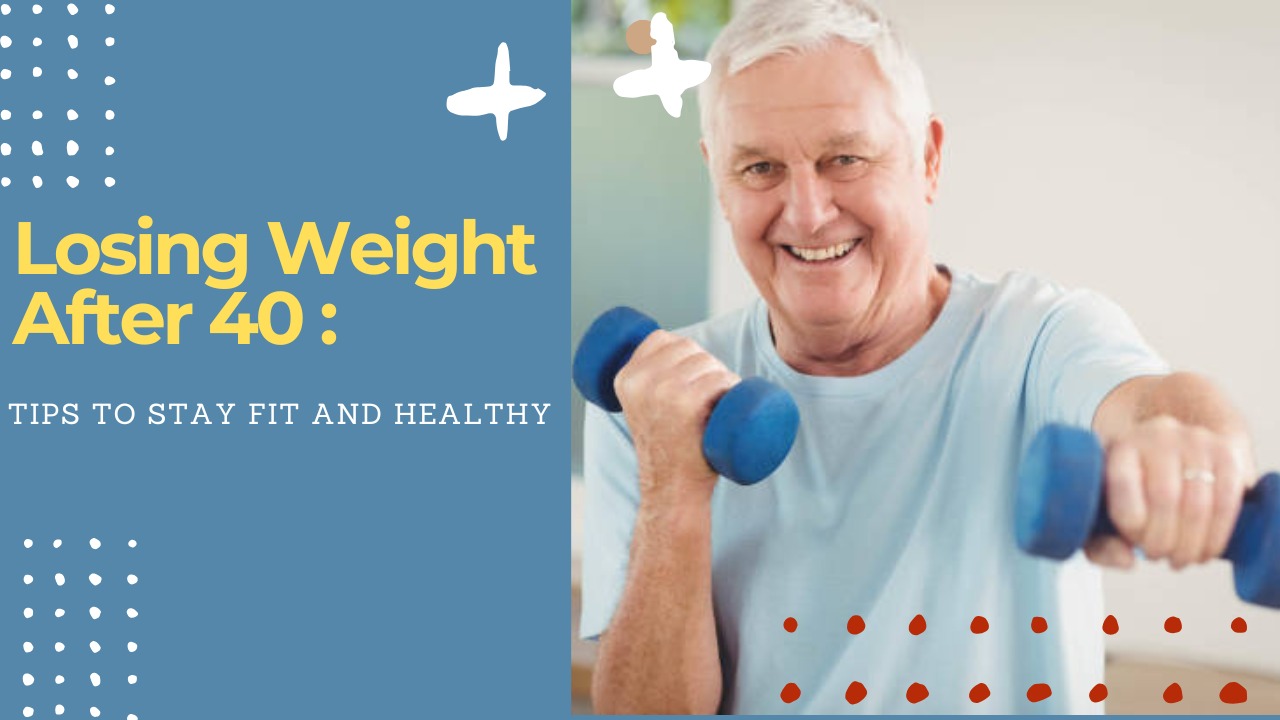Losing weight after 40 can be more difficult than it was in your younger years. Many people notice that the same diet and exercise routines no longer bring the same results. This is not only frustrating but also confusing, as the body begins to respond differently due to age-related changes.
Several factors contribute to this challenge. Hormonal fluctuations, especially in women during perimenopause and menopause, can affect how the body stores fat. Muscle mass naturally decreases with age, slowing down the metabolism. These changes make it harder to burn calories efficiently, even when activity levels remain the same.
In addition to physical changes, shifting responsibilities and Healthy lifestyle habits often play a role. Balancing work, family, and personal time may limit opportunities for exercise and healthy eating. All these factors combined make losing weight after 40 more complex, but with the right approach, it is still very possible to reach and maintain a healthy weight.
Why Is It Harder to Lose Weight After 40 ?
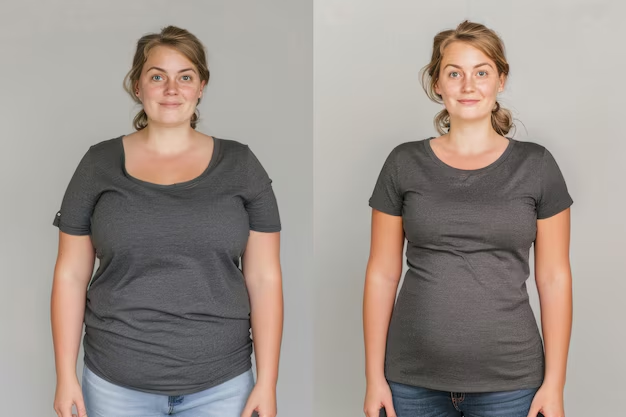
Before diving into solutions, it’s important to understand why your body behaves differently after you turn 40:
Slower Metabolism
As you age, your basal metabolic rate (BMR)—the amount of energy your body uses at rest—naturally slows down. This decline means your body burns fewer calories than it did in your younger years, even if your daily routine hasn’t changed.
For those focused on losing weight after 40, this slower metabolism can make weight loss more difficult. To see results, it often becomes necessary to adjust calorie intake and increase physical activity to match the body’s changing energy needs.
Hormonal Changes
Hormones play a critical role in weight management:
Women may experience perimenopause and menopause, which decrease estrogen levels, often leading to fat accumulation around the abdomen.
Men face a gradual decline in testosterone levels, which can contribute to muscle loss and increased fat storage.
Loss of Muscle Mass
Starting around the age of 30, adults naturally begin to lose between 3–8% of their muscle mass with each passing decade, especially if they do not regularly engage in strength or resistance training. Since muscle burns more calories than fat, having less muscle reduces the number of calories your body burns at rest. This decline makes losing weight after 40 more challenging, as the body’s natural calorie-burning ability slows down with time.
Lifestyle Factors
By the time people reach their 40s, life often becomes more demanding. Many are balancing careers, raising children, and caring for aging parents. These pressures can lead to increased stress, disrupted sleep patterns, limited time for exercise, and a higher dependence on fast or processed foods. All of these lifestyle shifts can contribute to gradual weight gain, making losing weight after 40 more difficult without intentional changes to daily habits.
Effective Tips to Lose Weight After 40
Here are the most important, research-backed strategies tailored for people over 40 who want to lose weight effectively:
Prioritize Protein

Protein becomes increasingly important as you get older, especially when focusing on losing weight after 40. As your body begins to lose muscle mass naturally with age, eating enough protein can help slow that process. Muscle is key for keeping your metabolism active, and protein supports muscle repair and growth, even during weight loss.
In addition to muscle support, protein helps keep you full for longer periods, reducing the chances of overeating or snacking on unhealthy foods. This can be especially helpful when managing cravings or trying to stick to a calorie-conscious eating plan. For those losing weight after 40, including lean protein in every meal can make it easier to maintain energy levels and support healthy body composition.
Aim for: 20–30g of protein per meal
Good sources: Eggs, Greek yogurt, lean meats, legumes, tofu, protein shakes
Cut Back on Refined Carbs and Sugars
Highly processed carbohydrates, such as white bread, pastries, and sugary snacks, can cause quick spikes in blood sugar and insulin levels. These rapid increases are often followed by sharp drops, leading to energy crashes and increased hunger soon after eating. This cycle encourages the body to store more fat, especially around the belly area, which can be harder to lose as you age.
For those focused on losing weight after 40, it becomes even more important to avoid processed carbs. As metabolism slows and hormonal changes occur, the body becomes more sensitive to blood sugar fluctuations. Choosing whole grains, vegetables, and fiber-rich foods can help maintain steady energy levels, reduce cravings, and support long-term weight management goals in your 40s and beyond.
Limit white bread, pastries, soda, and sweets.
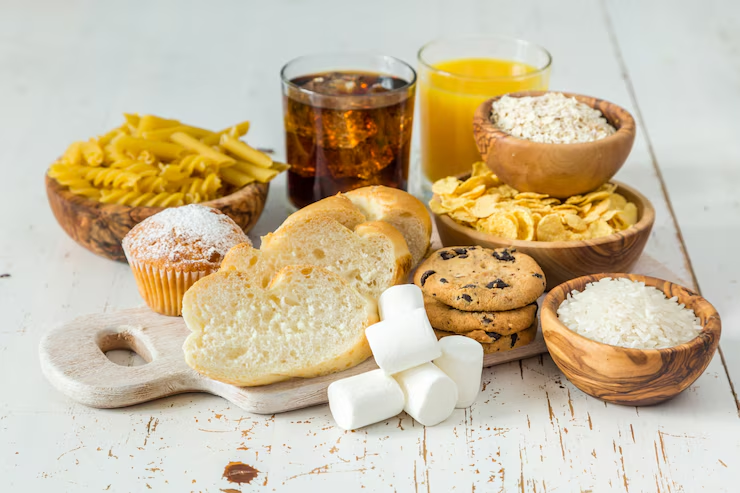
Replace them with whole grains, fruits, vegetables, and healthy fats.
Manage Stress
Stress has a powerful effect on the body, especially when it’s ongoing. When you’re stressed, your body releases a hormone called cortisol. High levels of cortisol can lead to increased fat storage, particularly around the belly area. This type of fat is more difficult to lose and can also be linked to other health problems.
For those focused on losing weight after 40, managing stress becomes even more important. As you age, hormonal changes and lifestyle pressures may increase stress levels, making weight loss more challenging. Finding healthy ways to reduce stress—such as regular exercise, meditation, or better sleep—can help keep cortisol levels in check. This not only supports weight management but also improves overall well-being during the weight loss journey.
Try meditation, deep breathing, yoga, journaling, or even a relaxing walk.
Set boundaries to protect your mental space and emotional energy.
Get Enough Sleep
Poor sleep affects key hormones that control hunger and fullness—leptin and ghrelin. When you don’t get enough rest, leptin (which signals fullness) drops, while ghrelin (which triggers hunger) rises. This hormonal imbalance can lead to increased appetite, stronger cravings for unhealthy foods, and more frequent snacking throughout the day.
For people focused on losing weight after 40, quality sleep becomes even more important. As the body ages, sleep patterns can change, and stress or hormonal shifts may disrupt rest. These changes make it easier to gain weight and harder to stick to a healthy eating plan. Prioritizing good sleep habits can support better hormone balance, reduce unnecessary eating, and help make weight loss efforts more effective in your 40s and beyond.

Aim for 7–9 hours of quality sleep per night.
Develop a sleep routine: limit screens before bed, keep the room dark and cool, and go to bed/wake up at the same time each day.
Drink More Water
Staying properly hydrated plays an important role in supporting a healthy metabolism. Water helps the body process calories more efficiently and keeps energy levels steady throughout the day. Many people also confuse thirst with hunger, leading to unnecessary snacking or overeating when the body actually needs fluids, not food.
For those focused on losing weight after 40, drinking enough water becomes even more helpful. As metabolism naturally slows with age, small habits like staying hydrated can make a meaningful difference. Drinking a glass of water before meals can also help control appetite and prevent overeating. Making hydration a regular part of your routine is a simple but effective way to support weight loss and overall well-being in your 40s and beyond.
Limit Alcohol Consumption
Alcohol can make losing weight after 40 more difficult for several reasons. First, it’s high in empty calories that add up quickly without offering any nutritional benefits. Drinking also lowers inhibitions, which makes it easier to overeat or choose unhealthy foods you might otherwise avoid. These effects can seriously impact your weight loss efforts.
In addition, alcohol can interfere with sleep quality, which in turn disrupts hormones that control hunger and metabolism. It can also slow down how your body burns fat, making weight loss slower and harder. For those losing weight after 40, reducing or limiting alcohol intake can help improve sleep, boost metabolism, and support better control over food choices, all of which are important for long-term success.

Opt for low-calorie drinks, limit to 1–2 drinks per week, or cut it out altogether if possible.
Eat More Fiber
Fiber is an essential part of a healthy diet, especially when you’re focused on losing weight after 40. It helps you feel full longer, which can reduce overeating and unhealthy snacking between meals. High-fiber foods also take more time to digest, keeping hunger under control and supporting better portion control throughout the day.
In addition to promoting fullness, fiber plays an important role in gut health by supporting digestion and regular bowel movements. It also helps regulate blood sugar levels, preventing sharp spikes and crashes that can lead to cravings. For those losing weight after 40, adding more fruits, vegetables, whole grains, and legumes into your meals can provide the fiber needed to support weight management and overall health.
Sources: Whole grains, berries, beans, lentils, chia seeds, vegetables
Goal: 25–30 grams per day
Track Your Progress
Monitoring your daily habits—such as food choices, exercise, sleep, and hydration—can greatly improve your awareness and accountability. Keeping track of what you eat and how active you are helps you see patterns that may be holding you back. This simple habit can encourage more mindful decisions and reveal areas for improvement.
For those focused on losing weight after 40, self-monitoring becomes even more important. As metabolism slows and responsibilities increase, it’s easy to overlook how small habits affect progress. Using a journal or app to track meals, workouts, and sleep can provide structure and motivation. It helps you stay focused on your goals and makes it easier to adjust your routine when necessary for long-term success.
Use apps like MyFitnessPal or Lose It to track food and exercise.

Weigh yourself weekly or measure your waist circumference to track fat loss.
Don’t Skip Meals—Especially Breakfast
Skipping meals may seem like a quick way to reduce calories, but it often has the opposite effect. When you go too long without eating, your body may respond by slowing down metabolism to conserve energy. This means fewer calories are burned throughout the day, making weight loss more difficult.
For those focused on losing weight after 40, skipping meals can lead to intense hunger later, which often results in overeating or making poor food choices. As your metabolism naturally slows with age, regular balanced meals become more important for maintaining energy and supporting weight loss. Eating consistently throughout the day helps keep your metabolism active and reduces the risk of unhealthy snacking or binge eating.
Have a balanced breakfast with protein, healthy fat, and complex carbs (e.g., eggs, avocado, and oats).
Move More Throughout the Day
While regular workouts are important, increasing your non-exercise activity thermogenesis (NEAT) can also make a big difference when losing weight after 40. NEAT includes the calories burned during everyday movements like walking, cleaning, gardening, or even fidgeting. These small activities add up over time and help boost your overall daily calorie burn.
As metabolism slows with age, adding more movement into your day can help overcome the natural decline. Simple habits like taking the stairs, parking farther away, or standing while working can support your weight loss goals without requiring intense workouts. For those focused on losing weight after 40, combining structured exercise with more daily movement can lead to better long-term results and improved overall health.
Take the stairs, walk while on calls, stretch every hour.
Aim for 7,000–10,000 steps daily.
Consider Intermittent Fasting (IF)
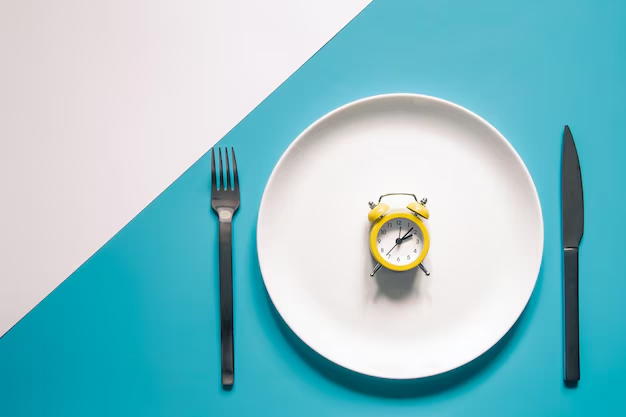
Intermittent fasting (IF) can be a helpful tool for losing weight after 40. It involves eating during a specific time window and fasting for the rest of the day. This approach may help regulate appetite, reduce late-night snacking, and allow the body more time to burn fat for energy. Over time, it can support a calorie deficit without the need to count every calorie.
For those losing weight after 40, IF can also help balance hormones that control hunger and metabolism, which often change with age. By limiting the hours you eat, you may naturally reduce your calorie intake and make healthier food choices. However, it’s important to listen to your body and choose an eating window that fits your lifestyle and energy needs for the best results.
Common method: 16:8 (fast for 16 hours, eat during an 8-hour window)
Works best when combined with a nutrient-dense diet
Weight Loss for Men After 40
Men typically lose testosterone with age, which can slow metabolism and increase belly fat:
Add weight training and HIIT (high-intensity interval training)
Prioritize zinc-rich foods (like pumpkin seeds) and healthy fats (avocados, nuts)
Cut back on alcohol and processed foods to support hormone balance
Sample Day of Eating for Weight Loss After 40
| Meal | Food Items |
|---|---|
| Breakfast | – 2 eggs – 1 slice of whole-grain toast – 1/2 avocado – Green tea or black coffee |
| Snack | – Greek yogurt with berries and chia seeds |
| Lunch | – Grilled chicken salad with mixed greens – Olive oil, nuts, and quinoa – Sparkling water |
| Snack | – Handful of almonds – A piece of fruit |
| Dinner | – Baked salmon – Roasted sweet potatoes – Steamed broccoli |
| Evening | – Herbal tea – Small square of dark chocolate (optional) |
What to Avoid
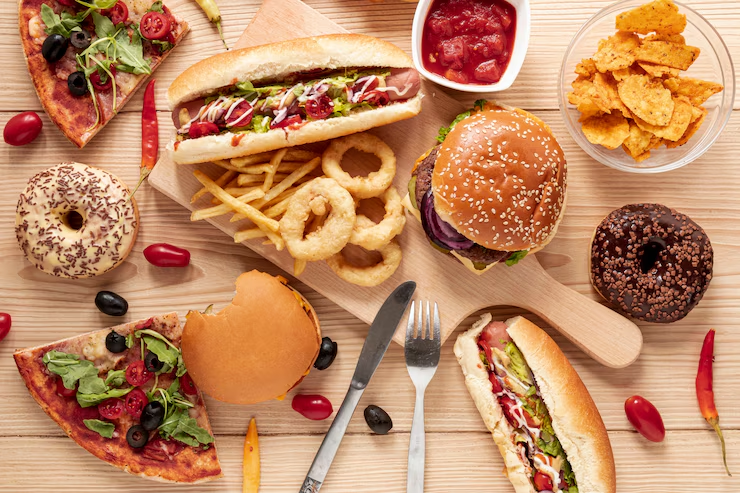
Crash Diets: Crash diets may promise quick results, but they can harm your metabolism and lead to nutrient deficiencies. When your body doesn’t get enough calories or essential nutrients, it starts to conserve energy, slowing down fat burning. For those focused on losing weight after 40, this can make future weight loss even harder and impact long-term health.
Over-Exercising: Working out too much without proper rest can lead to physical burnout, injuries, and hormonal imbalances. It’s important to balance movement with recovery, especially when losing weight after 40, as the body needs more time to recover and stay strong.
All-or-Nothing Thinking: Having one unhealthy meal doesn’t mean you’ve failed. Progress takes time and consistency. Losing weight after 40 requires a flexible mindset—small slip-ups are normal and don’t erase your efforts.
Comparisons: Comparing your progress to others can discourage you. Everyone’s body responds differently. Focus on your own goals and wins when losing weight after 40.
Conclusion
Losing weight after 40 may come with its unique set of challenges, but it is entirely achievable with the right mindset, consistent habits, and a personalized approach. As our bodies change with age, it’s essential to focus on strategies that support hormonal balance, muscle preservation, and sustainable eating patterns.
By prioritizing strength training, increasing protein and fiber intake, managing stress, and getting quality sleep, you can unlock long-term health and vitality. Remember, this stage of life is not a limitation but an opportunity to redefine your wellness goals. Don’t be discouraged by temporary setbacks—small, consistent changes lead to lasting results.
Whether your aim is to feel more energized, improve your health markers, or simply regain confidence, losing weight after 40 is possible and incredibly rewarding. Embrace the journey with patience and purpose, and your future self will thank you for the effort you invest today.
FAQs
- Why is losing weight after 40 more difficult ?
As you age, your metabolism slows down, muscle mass decreases, and hormonal changes can affect how your body stores fat, making weight loss more challenging. - How can I boost my metabolism after 40 ?
Strength training, eating enough protein, staying active throughout the day, and getting quality sleep can help keep your metabolism active. - Should I avoid carbs completely ?
No, but it’s best to limit processed carbs and focus on whole foods like vegetables, fruits, and whole grains for balanced nutrition. - Is intermittent fasting safe after 40 ?
For most healthy adults, intermittent fasting can be helpful. However, it’s best to consult a healthcare provider before starting any new eating routine. - How important is sleep in losing weight after 40 ?
Very important—poor sleep disrupts hunger hormones, increases cravings, and slows metabolism, making weight loss harder.

